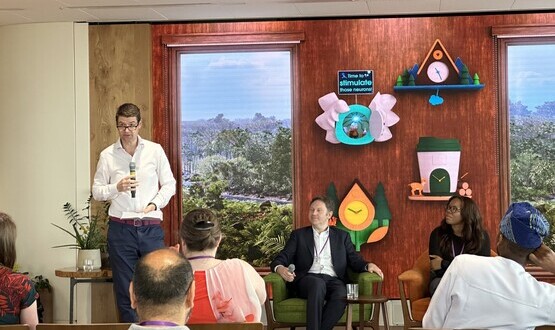Networks debate panel believe there is no current NHS EPR monopoly
- 14 December 2023

In a lively Digital Health Networks debate on the drive to standardise EPR systems and the risks of creating monopolies, the panel shared the view that currently there is not a monopoly in the NHS hospital EPR market, but more needs to be done to develop relationships with suppliers.
Chaired by Digital Health CEO Jon Hoeksma, the panel consisted of Devesh Sinha, stroke consultant and CCIO at Barking, Havering and Redbridge University Hospitals NHS Trust, Peter White, CNIO at Alder Hey Children’s Hospital, Dr Penny Kechagioglou, CCIO and deputy chief medical officer at University Hospitals Coventry and Warwickshire NHS Trust, and Adrian Byrne, former CIO, University Hospital Southampton NHS Foundation Trust.
The general view from the panel was that there is not currently a monopoly in the hospital EPR market in the NHS, but instead some good suppliers and a range of them that are working with the NHS.
The panel shared the view that there is lots of scope for further developing the quality and timeliness of dialogue with suppliers as true partners.
Being mindful
Dr Kechagioglou said “we need to be generally mindful of monopolies” and that “competition is one incentive for innovation to flourish because any provider is trying to create some competitive advantage over others”, but the domination of the market by a smaller number of suppliers could stifle innovation.
She also highlighted “bigger providers need to be quite mindful” of homegrown systems and their increasing capability in the NHS and organisations that have created their own systems.
Byrne said that “the market is probably not big enough to sustain the level of functionality and the number of procurements that go on… the market will really only sustain a certain number of them”.
He added that it is “inevitable that you end with a handful” and made clear his hope that “one or two more do get fully developed and start to become equal players” in the market.
Sinha took the view that “we probably are sitting in the danger of monopoly since the convergence talk begun, we are not mature enough to have interoperability at this stage so we will probably head towards a single monopoly in secondary care, very likely primary care”.
Opportunity
He did however conclude that “there is opportunity within monopoly” despite it not being viewed as “attractive”.
White agreed that there is opportunity: “I think monopolies can be okay due to the collective influencing voice of the NHS, but we need to encourage and support innovation across the NHS”.
A previous Digital Health Networks debate looked at beliefs about the use of AI into healthcare and concluded that AI can be integrated safely into clinical use where proper guidelines are in place.





1 Comments
The issue I’ve seen discussed is that beyond Frontline Digitisation, those smaller systems will not have the new clients they need to stay afloat.
They may look abroad, but then their efforts move away from their NHS clients, with their typical agile innovation approach being pointed elsewhere.
It’s difficult to see beyond the larger EPR providers for anything long-term.
Comments are closed.